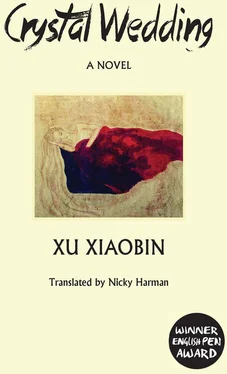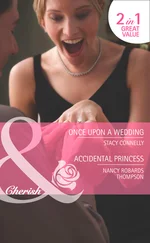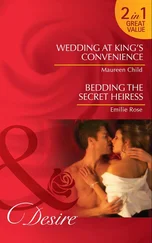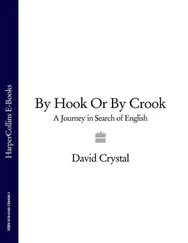Xiaobin Xu - Crystal Wedding
Здесь есть возможность читать онлайн «Xiaobin Xu - Crystal Wedding» весь текст электронной книги совершенно бесплатно (целиком полную версию без сокращений). В некоторых случаях можно слушать аудио, скачать через торрент в формате fb2 и присутствует краткое содержание. Год выпуска: 2016, Издательство: Balestier Press, Жанр: Современная проза, на английском языке. Описание произведения, (предисловие) а так же отзывы посетителей доступны на портале библиотеки ЛибКат.
- Название:Crystal Wedding
- Автор:
- Издательство:Balestier Press
- Жанр:
- Год:2016
- ISBN:нет данных
- Рейтинг книги:3 / 5. Голосов: 1
-
Избранное:Добавить в избранное
- Отзывы:
-
Ваша оценка:
- 60
- 1
- 2
- 3
- 4
- 5
Crystal Wedding: краткое содержание, описание и аннотация
Предлагаем к чтению аннотацию, описание, краткое содержание или предисловие (зависит от того, что написал сам автор книги «Crystal Wedding»). Если вы не нашли необходимую информацию о книге — напишите в комментариях, мы постараемся отыскать её.
Crystal Wedding — читать онлайн бесплатно полную книгу (весь текст) целиком
Ниже представлен текст книги, разбитый по страницам. Система сохранения места последней прочитанной страницы, позволяет с удобством читать онлайн бесплатно книгу «Crystal Wedding», без необходимости каждый раз заново искать на чём Вы остановились. Поставьте закладку, и сможете в любой момент перейти на страницу, на которой закончили чтение.
Интервал:
Закладка:
She had only ever known Prague through novels and songs, but now she was really here. Her first glimpse of the city was at night. The young man who came to pick them up from the airport, Tony, was the son of one of Prague’s most famous sinologists. He had been given a Chinese name by his father, he told them: Lu Weida. Tianyi was wearing a plum-coloured velvet jacket, her short hair was neatly combed and topped with a few little curls. It was a feisty look, and her belted jacket showed off her figure. Today she was full of youthful energy. Tony gave her admiring glances.
Tianyi’s heart gave a little flutter, too, when she first saw him. He was not exactly handsome, but there was an attractively saturnine look about him. He was tall and thin, rather how she imagined Kafka in his youth. (She told him this later in the trip, and to her surprise he was pleased: ‘Yes, I played Kafka in my school play.’) When they got to the hotel, she wheeled her suitcase towards her room. Then she glanced back and saw him still standing by the stairs, under the dim lighting, staring after her.
The trip passed off pleasantly. Tony’s father, the sinologist, took them around and acted as interpreter. She did not take to the food, however. Once, the head of the Prague Writers’ Association invited them out to dinner but the table was a desert, and the best thing on offer was a plate of fried potato cakes. The next day the Chinese delegation treated their hosts to dinner at a local Chinese restaurant. The table was filled with dishes to share, but to their amazement the head of the Association pulled a plate of fried meat in front of him and started shovelling it in. They stared at him in disbelief. He kept eating. Tianyi looked up from her plate and caught Shanliang’s eye, and they traded half-smiles.
Tony was a fussy eater, full after a couple of mouthfuls, after which he would turn to his coffee, sipping at it endlessly. He looked down, seeming lost in thought, at least when he was not glancing sideways at Tianyi.
A Chinese student washing dishes at the restaurant was, in turn, staring at Tony. Then she boldly walked up to him and, taking a camera out of her pocket, said: ‘Do you mind having a picture taken with me?’
Tony looked at her blankly, but in the meantime Tianyi had accepted the camera and took a few shots. Tony was serious, the girl all smiles.
Tony’s father went by the Chinese name Lu Hua. When the elder Lu suggested they go and pay their respects at the grave of another famous sinologist, Dvorak, the Chinese delegation agreed with alacrity.
It was drizzling that day, and Prague was wrapped in a grey mist. The greyness made Tianyi think of The Unbearable Lightness of Being and The Joke , though this Prague was no longer the gentle Prague of Milan Kundera’s novels. But, as Chun kept emphasising, the Czechs were gentle people. Indeed they are, Tianyi thought. The old sinologist and his son were very gentle. Two days before, when they were visiting the Czech National Library, Tianyi had spoken to a group of Czech students who were studying Chinese, Tony among them. Each in turn explained his or her Chinese name. Tianyi praised each one, hesitating only at Tony’s. She told him it sounded rather ordinary. Tony became anxious, explaining that his father had given it to him, that it had a good meaning. Tianyi rushed to correct herself. Yes, of course, now that she thought about, it did sound like a good name. He gave a shy, gentle smile.
They stood at Dvorak’s grave in the rain. They had brought flowers and a candle. To their surprise, Tony’s elderly father was standing there, waiting for them. The head of their group hurried over to shake his hand. They had no idea how long he had been waiting in the rain.
Tianyi, not anticipating how cold it would be, was inadequately dressed and shivered. Tony removed his down jacket and draped it over her shoulders. Tianyi made a half-hearted attempt to refuse it, but he was insistent, saying in his stumbling Chinese: ‘You … must wear it … because … you are a woman … I am a man … You are a guest, I am a host …’ She accepted it and felt instantly warmer. Well, that was a good enough reason for wearing it, wasn’t it? It made her look rather comical, and their group leader said she looked just like the Good Soldier Schweik.
They all posed for a photograph. Tony put the candle into the candleholder on the grave, and lit it. The small flame glittered like crystal in the rain, making the gravestone glitter in its turn. The gravestone in the rain was a warm, gentle memory, one she would never forget.
Many years later, Tony would come to Beijing. With him came the young Chinese woman who had been washing dishes in the restaurant in Prague, now his wife.
Autumn in Karlovy Vary was bathed in a majestic gold. A golden wind blew golden leaves onto golden rooftops. Under golden rays of sunshine, Tianyi walked past stalls lining the streets, full of glassware that glinted like melting snow on mountain peaks. She spotted a particularly fine and very cheap set of tall-stemmed glasses with gilded rims. Czech glass was famous, of course. But few people knew that the glass from Karlovy Vary was the finest.
The walls of an ancient fortress lined the shady side of the street. Here too were the springs, the most magical part of the town. Drinking from them required a special procedure, starting with the purchase of a ceramic pot. The market stalls around the springs were piled high with these pots, in all different styles. Unlike the clay in Chinese pots, this clay was warm to the touch, and had a mellow gleam like jade in the sunlight. Tianyi bought a pretty one, glazed a dark red, the colour of red bean paste, and decorated with a grey rose. It cost her almost nothing. According to the embassy’s secretary, Gao, people used these pots to scoop up the water from the spring. She tried it and, although the water seemed a little saline, it was warm and tasted pleasant. At the springs, Tianyi saw something very odd: a Czech woman put a rose into the water, and before the eyes of the onlookers, it turned the colour of iron-sand. When she took it out, it was withered and had lost its fragrance, but acquired a strong mineral smell. So this was what Karlovy Vary was famous for! Little Gao told them that all the shops sold these chalky-gray, mineral-covered roses. The town was known for them.
After lunch they went shopping, and saw the roses everywhere. But for some reason, even after examining them more closely, Tianyi could not summon any interest in buying one. These once-beautiful flowers had metamorphosed into something else entirely. It was fun to watch them change colour, but then there was nothing special about them anymore. It seemed her companions felt the same way. The heap of roses, turned iron-grey, lay motionless looking like the slag left behind after iron smelting. Not a thing of beauty at all.
Tianyi sat very still by the hot spring and thought, so this is Karlovy Vary. This was the place where she had won her first-ever prize, for the film The Tree of Knowledge . That drew her to the town, as if they were old friends. The prize had aroused a flicker of hope in her, had awoken her ambitions. But that was all in the past. It would be foolish to hope for anything new to happen in her life now. No changes would be for the good. So many gorgeous fresh flowers in this life ended up as slag.
24
W hen the trip to the Czech Republic came to an end Tianyi returned to China. Strangely, she could not for the life of her remember what her husband looked like. She had forgotten him. It frightened her.
Cooking was now the fuse that triggered Lian’s temper. He no longer wanted to be a model husband. Whenever he was at home he would lie flat out on the sofa watching the television. The house was like a powder keg, even the slightest spark could set it off. Tianyi had always been sensitive, and now she was a nervous wreck. To calm her nerves, she paid someone to come in and help out every day. The woman was from Anhui, and very capable, though a bit rough around the edges. It only took her two hours to do the laundry, cook and tidy up, but it took the pressure off Tianyi. These days she had to do her writing in secret. Lian did not say anything, but she was very tense all the same. Only once her husband and son had gone to sleep at night did she feel free to sit in front of her old Sitong 2403 word processor. She would stare at its small screen, tapping away at the keyboard, noticing how her fingers were looking rougher by the day, like a countrywoman’s. Here, she could enter into another world, one of her own invention. She knew it was entirely illusory, but whatever it was, it was better than reality. At least in that imaginary world she could force herself to go on living.
Читать дальшеИнтервал:
Закладка:
Похожие книги на «Crystal Wedding»
Представляем Вашему вниманию похожие книги на «Crystal Wedding» списком для выбора. Мы отобрали схожую по названию и смыслу литературу в надежде предоставить читателям больше вариантов отыскать новые, интересные, ещё непрочитанные произведения.
Обсуждение, отзывы о книге «Crystal Wedding» и просто собственные мнения читателей. Оставьте ваши комментарии, напишите, что Вы думаете о произведении, его смысле или главных героях. Укажите что конкретно понравилось, а что нет, и почему Вы так считаете.












